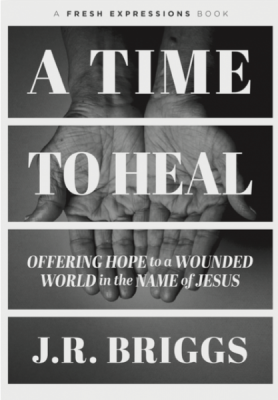by guest writer, J.R. Briggs,
“A Christian response of love in the midst of a global tragedy is far from unprecedented. We’re grateful to read stories of the past, but what about the future? Our call is to train our eyes – and help other people look for those in need of healing, even when it isn’t always apparent. If the world is ever going to consider looking in the direction of church for its healing, we must first look in these ten specific areas.
1. See the Bible as a book written to traumatized people.
Consider who the Bible was most frequently written to. The Scriptures – both Old and New Testaments – were not written to comfortable, healthy people in power, but instead to a group of discouraged, displaced, distressed, and oppressed people marked by trauma. Think of the stories of traumatized people found in the Bible:
- The runaway and abused slave girl Hagar.
- Joseph was sold into slavery by his own brothers.
- Noah’s family witnessed the destruction of the world through a global flood.
- Jonah was trapped in the stomach of a large fish for a few days after suffering a life-threatening squall.
- The entire nation of Israel was enslaved and in exile by the oppressive, unjust pagan nation of Egypt.
- Moses was on the run for his life after murdering an Egyptian.
- The prophet Elijah fled because of the death threat from evil tyrants.
- Job’s immense emotional, relational, and physical suffering.
- Tormented parents in Bethlehem who had experienced infanticide. Mary would have been friends and neighbors with mothers whose baby boys had been murdered by King Herod.
- Mary and Joseph fled to Egypt as refugees.
- Mary Magdalene was delivered from not one, but seven demons (and later became one of Jesus’ closest followers).
- John the Baptist experienced a gruesome beheading at a royal banquet.
- Jesus suffered naked on the cross through harrowing crucifixion.
- Early Christians were arrested, persecuted, and executed in the book of Acts.
In the pages of our Bible, trauma is everywhere. It is essential we read Scripture through the lens of trauma. The book of Lamentations and much of the Psalms contain raw and desperate prayers of suffering people. If the Old Testament was written mostly to the people of God who were in exile, and if both testaments were written to people who were oppressed, traumatized, and suffering, how might this shape how we read our Bibles today?
One of the simplest and most practical ways for congregations to cultivate a good kingdom imagination as healers is to allow the biblical text to shape our individual and collective thinking. If we can see the overarching story of Scripture – the shalom-creating God and a shalom-rejecting humanity, who are traumatized and in need of being saved, delivered, and healed by a shalom-bringing Jesus – our people will begin to see more fully the vision of what it means to live like Jesus. But it may mean pastors need to preach other difficult texts not often preached on, such as the Psalms of Lament. The Body of Christ to a Hurting World?
You may want to start by journeying through the gospel of Mark, which, as we explored earlier, is laden with healings, right from chapter one. Or, you may want to study and explore Dr. Luke’s gospel and pay close attention to those stories of healing. Look at the parables about healing and trauma. Consider the story of the Good Samaritan in Luke 10. The Samaritan soothed the wounded man with oil and wine and bandaged his wounds. He then took him to an inn to care for him further. He even handed the innkeeper two silver coins and told him to be a part of the healing process, too. Have you ever pondered this story through the lens of healing? As you immerse yourself in the stories of healings in the gospels, pause and read them slowly. Ask and discuss with others where there are wounds and brokenness and where we long to experience healing in our own lives. And then ask where we might join God in his work of healing in specific and practical ways. Inquire where there are areas, groups of people, or individuals in our community who are hurting and in need of experiencing radical compassion. Where can we be the sozo people of God?”
This excerpt was taken from A Time to Heal: Offering Hope to a Wounded World in the Name of Jesus by J.R. Briggs, which was released on April 27, 2021.
Bio for J.R. Briggs

Dr. J.R. Briggs is the founder of Kairos Partnerships, an organization that equips, empowers, encourages, and serves as a companion to leaders on the journey of leadership and ministry. He is a coach, consultant, seminary professor, and author of several books on topics which seek to empower leaders.
Sign up to join us for this virtual retreat experience Making Time for a Sacred Summer with Christine Sine and Lilly Lewin!


